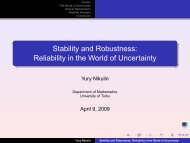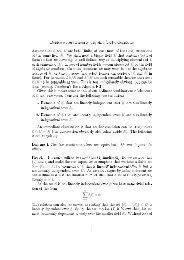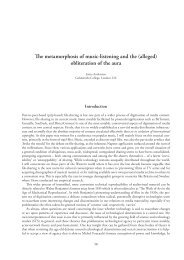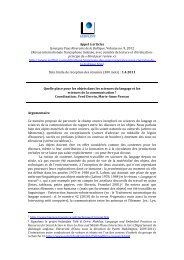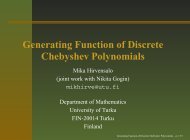The Chemical Age: Presenting history with metaphors∗
The Chemical Age: Presenting history with metaphors∗
The Chemical Age: Presenting history with metaphors∗
Create successful ePaper yourself
Turn your PDF publications into a flip-book with our unique Google optimized e-Paper software.
<strong>The</strong> <strong>Chemical</strong> <strong>Age</strong>discussion of metaphors can reveal something of the late eighteenth centurycultural conventions that were used to make <strong>history</strong> meaningful by thedeployment of mechanical, organic and chemical metaphors. Althoughmy topic is philosophical thought, my approach will be cultural-historicalin two senses.First, in addition to traditional argument analysis, I propose to takeaccount of how those arguments are connected <strong>with</strong> German culture ofthe 1790s. I understand philosophical thinking to be a cultural activity,whose presuppositions are provisional and subject to historical change likeall human activity. I do not want so much to relativize those arguments, asto make them comprehensible <strong>with</strong>in the historical context in which theywere presented. My first methodological supposition is that in general,cultural context will always clarify a particular text.Second, the cultural-historical study of metaphors used by Schlegelcan produce new insights into how <strong>history</strong> was conceived in the eighteenthcentury. In this respect, my second methodological principle isthat interpretation can proceed from a particular text to the level of thecommon cultural totality of which it is a part. A part (text) becomesunderstandable in its connection <strong>with</strong> its respective whole (con-text), butreciprocally context is always constructed by reference to other texts –specifically primary sources. 4 People use their pre-existing knowledge inorder to conceive of new and unknown things. Metaphorical thinking isa linguistic method for relating the new to the familiar. 5 <strong>The</strong> metaphorsthat a past culture deployed and the changes in those metaphoric structuresconstitute both a field of research and a methodological resourcefor cultural <strong>history</strong>. <strong>The</strong> cultural system of metaphors can reveal how aparticular culture interpreted and made meaningful its reality by drawinganalogies between different things. 64 See Gadamer [1960] 1990, p. 272; Tontti 2005, p. 60.5 George Lakoff and Mark Johnson have claimed that every conceptual system presupposesa metaphorical system. Lakoff & Johnson 1980, p. 22. Even the etymology ofword ‘concept’ from Latin capere (to take) implies a metaphor of grasping something<strong>with</strong> the hand. <strong>The</strong> German Begriff (concept) is similarly based on the metaphor ofgreifen (grasp).6 According to Immanuel Kant, analogy means an identity of relation between any twoordered pairs. <strong>The</strong> analogical mode of producing knowledge follows the form: A is toAsko Nivala: <strong>The</strong> <strong>Chemical</strong> <strong>Age</strong>: <strong>Presenting</strong> History <strong>with</strong> Metaphors. In: Bruce Johnson & Harri Kiiskinen (eds.): <strong>The</strong>y DoThings Differently <strong>The</strong>re. Essays on Cultural History. Cultural History – Kulttuurihistoria 9. k&h, Turku, 2011. Pp. 81–108.83





